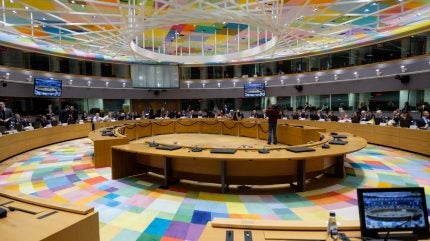
As the European Commission finalises its Low Carbon Delegated Act under the recently adopted Gas Directive, it faces a pivotal decision, writes Esther Bollendorff, senior gas policy coordinator at Climate Action Network (CAN) Europe.
Will the EU uphold its climate ambition, or will it allow fossil-based ‘blue’ hydrogen to masquerade as a clean solution? This legislative act will set rules for what qualifies as low-carbon hydrogen, a label that must be earned, not gifted. If the criteria are not ambitious enough, it risks legitimising so-called blue hydrogen, made from fossil gas with carbon capture and storage (CCS).
CAN Europe is deeply concerned that this pathway risks undermining the EU’s 2030 and 2050 climate targets. Instead of accelerating the energy transition, it could lock Europe into continued fossil fuel dependence.
What is blue hydrogen, and why is it problematic?
Blue hydrogen is often marketed as a climate-friendly option, but the reality is far more complex and dirty. It is produced from fossil gas, with CO₂ emissions being captured and stored underground through the very energy-intensive CCS process.
First of all, as highlighted in CAN Europe’s Paris Agreement Compatible (PAC) energy scenario, the EU needs to phase out fossil gas in the next ten years, by 2035. This is coming up fast, but there are showcase examples from progressive energy utilities and municipalities leading the way in that direction and showing that fossil-free regions are achievable. For instance, the German energy provider MVV plans to phase out gas and decommission its gas grid in the Mannheim region by 2035 without relying on fossil-based hydrogen, including for its industrial customer base.
Secondly, in addition to gas prices being very volatile, the CCS technology comes at a considerable cost and has not been implemented yet at scale. Currently, cost projections for blue hydrogen are double as much as for grey hydrogen (produced from gas without CCS) and comparable at the lower end to green hydrogen, produced from renewables.

US Tariffs are shifting - will you react or anticipate?
Don’t let policy changes catch you off guard. Stay proactive with real-time data and expert analysis.
By GlobalDataBut to understand the real impact of blue hydrogen, the associated methane emissions need to be accounted for.
The methane problem in the Low Carbon Delegated Act
Methane is an incredibly potent greenhouse gas, trapping over 80 times more heat than CO₂ over a 20-year period. It leaks into the atmosphere at every stage of fossil gas production – from upstream extraction to midstream transport and distribution. These methane leaks need to be taken into account when defining the greenhouse gas intensity of fossil gas and thereby the low-carbon label of fossil-based hydrogen.
Yet, the European Commission’s current draft Low Carbon Delegated Act severely underestimates how much methane is escaping across the supply chain.
The latest draft of the Low Carbon Delegated Act assumes a 2.3% methane leakage rate from fossil gas. While this is an improvement compared to previous versions, it still underestimates how much methane is actually leaking, meaning the impact of gas continues to be underestimated. According to the IEA’s Methane Tracker, average global methane emissions leakage is estimated at approximately 3.2%. Recently released direct measurement data show that leakage rates are as high as 7.8% in some basins in the US.
It is also very unclear how the Commission accounts for midstream methane leaks occurring during the transport of the gas, either through pipeline or liquefied natural gas (LNG) leaks, and the emissions due the transport itself through for example ships powered by LNG gas.
By using these weak default values, the EU would be giving blue hydrogen an unjustified climate-friendly label, misleading the public and national policymakers alike. It risks perpetuating dirty fossil gas trade and imports and fossil infrastructure lock-in, and it undermines the market for renewable hydrogen at a time where it needs to be scaled up significantly.
In addition, fossil gas based hydrogen, backed by public subsidies and labeled as “low-carbon”, risks creating new dependencies, such as from US LNG. The EU Commission, including Energy Commissioner Jorgensen and Commission President von der Leyen, do not exclude increasing US LNG imports to ease pressure on trade policies from US President Trump. At the risk of perpetuating continued gas use in the EU, even though recent ACER data shows that the EU’s gas demand has been decreasing by approximately 20% over the last three years and that LNG demand will shrink with the implementation of EU policies under the Fit for 55 and REPower plans.
What needs to change in the Delegated Act
To preserve the EU’s credibility, the Delegated Act must be strengthened in three key areas:
- At least triple the methane leakage default values: Use independent, science-based data (e.g., from MethaneSAT, Tropomi) to reflect actual emissions from upstream (extraction phase) and midstream fossil gas operations such as transport.
- Close the data loopholes: Methane reporting should be transparent and regionally aggregated, not cherry-picked by producers to showcase only their cleanest sites.
- Sound science-based Low Carbon Label with an end date: Keep the ‘low-carbon’ label to qualify hydrogen that has factored in scientifically accurate methane leakage rates (see point 1) significantly reducing CO₂ emissions across the supply chain and put an end date to the use of low carbon fuels by 2035.
A crucial test for climate leadership
The Low Carbon Delegated Act is not a technical footnote. It’s a test for the EU on whether it is prepared to lead the energy transition. Allowing methane-heavy fossil hydrogen to pass as ‘low-carbon’ risks derailing Europe’s clean energy future.
The EU must invest in renewable hydrogen, electrification and energy efficiency to stay on course towards climate neutrality, not prop up the gas industry with misleading climate labels and public money. The Low Carbon Delegated Act must contribute to the end goal of ensuring Europe’s climate leadership while staying competitive and putting all hands on deck to accelerate renewable hydrogen development.



